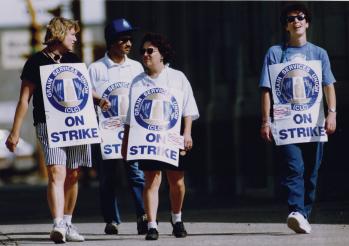

In September 1994, members of the Grain Services Union marched the picket line in the first-ever strike at the Saskatchewan Wheat Pool.
Charles Melnick (Regina Leader-Post)The Grain Services Union was created in Saskatchewan in 1936; today it has 1,200 members across western Canada, working in agriculture and other sectors.
Many employees of the new Saskatchewan Wheat Pool were strong co-op supporters; they also believed they should co-operate as workers. Pool elevator agents tried in the early 1930s to form an association, but the Depression set back their organizing efforts. Finally, in late 1936 a group of Pool head office employees organized the Saskatchewan Wheat Pool Employees' Association (SWPEA).
Among its early accomplishments, SWPEA reversed the salary cuts of the Depression and bargained a pension plan in 1943 (the Canada Pension Plan did not exist until 1966, so without a company pension workers faced poverty in old age). Similarly, through the 1950s and 1960s SWPEA bargained basic working conditions such as the five-day work week, because Canada had no national Labour standards until 1965.
Rank-and-file members wanted SWPEA to be more outspoken. In 1969 Bill Gilbey was hired as its new secretary-manager; he was a dedicated Communist who had organized relief-camp workers during the Depression. Gilbey joined SWPEA's battle against grain dust in the elevators. Dust-control equipment existed, but companies refused to acquire it; in the meantime, elevator workers were falling ill from breathing dust. In 1971, SWPEA and Wilbert Chambers, the elevator agent in Macrorie, overturned a Workers' Compensation board ruling that grain dust had not damaged his lungs. In 1973, the Pool agreed to install dust-elimination systems in some old and in all new elevators. By 1977, the union's lobbying resulted in a federal commission of inquiry. Following the commission's report, the government ordered all grain companies to install dust-control units in 1981.
SWPEA renamed itself the Grain Services Union (GSU) in 1974, after Manitoba Pool Elevators employees had joined. In 1979, GSU led the first grain-elevator strike in the Prairies, against Manitoba Pool Elevators. Western Canadian agriculture faced major changes in the 1980s and 1990s, and companies responded by cutting jobs and closing elevators. GSU members had never struck Saskatchewan wheat Pool - a result of mutual respect. But in 1994 Pool management demanded major cuts to the collective agreement, and GSU members launched a twelve-day strike which successfully resisted most of management's demands. In 1999, GSU general secretary Hugh Wagner led a successful campaign to end special hours of work for elevator workers: as of February 1, 2001, unionized and non-unionized elevator workers were entitled to paid overtime and to the eight-hour day, after decades of having to work extra hours without pay. In 1999, GSU organized in Perdue the first industrial hog-barn in western Canada, and lobbied to include hog-barn workers under the Labour Standards Act.